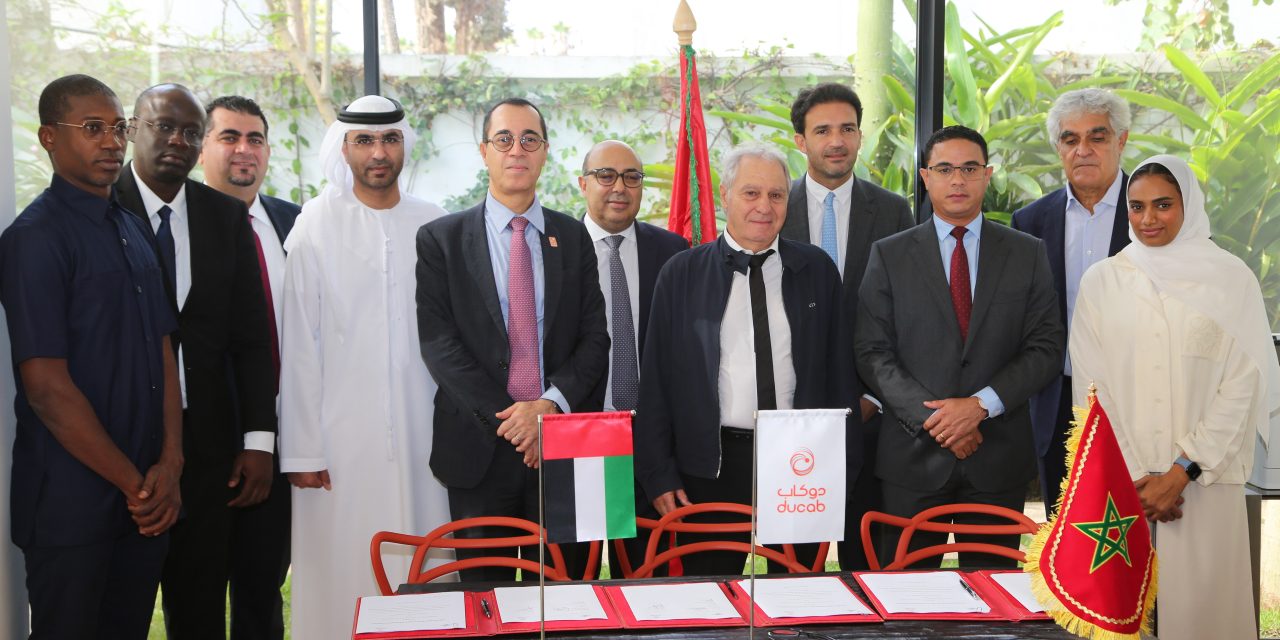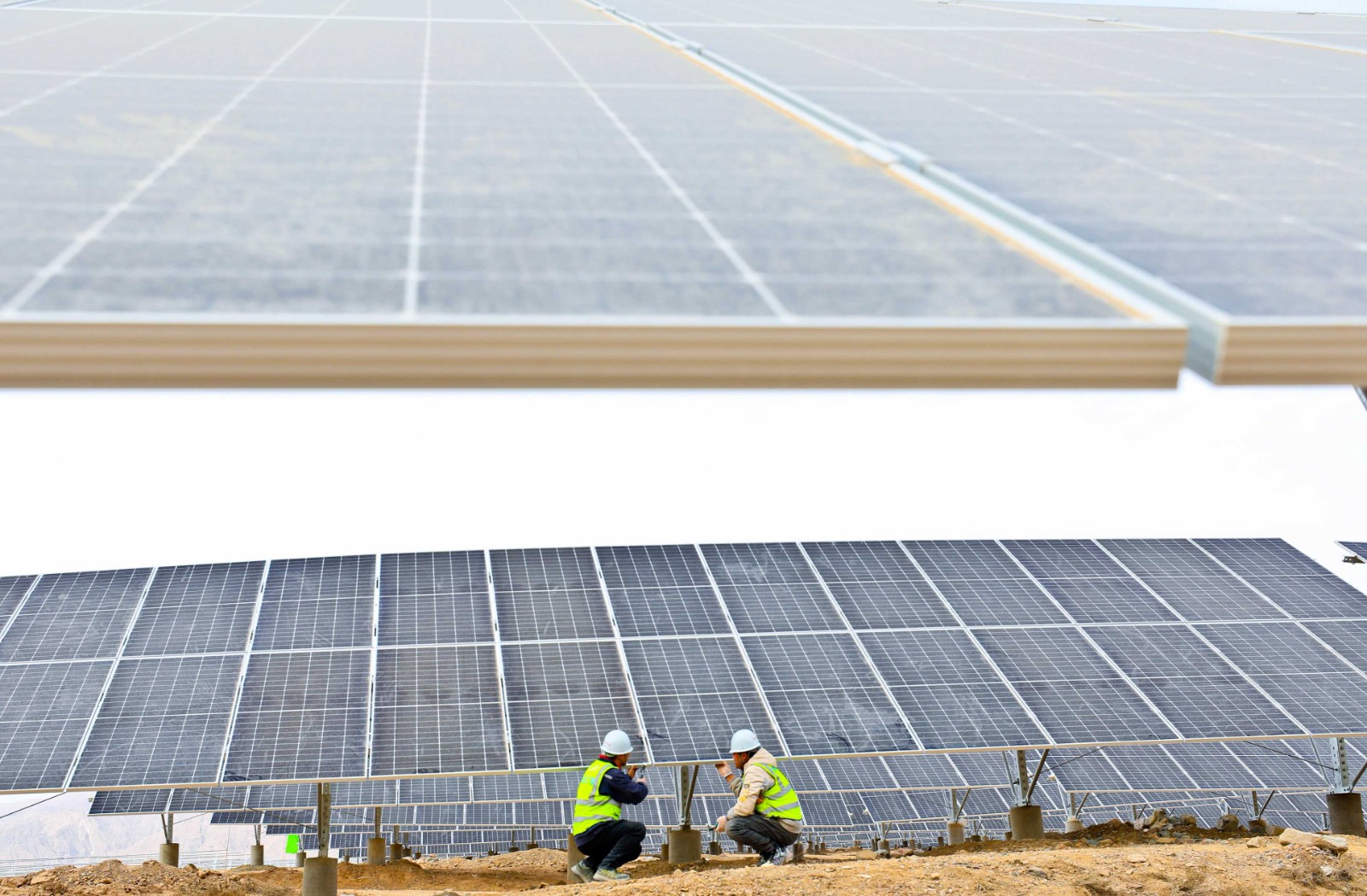Ducab Group marks its entry into the Angolan energy market with the signing of a Memorandum of Understanding (MoU) with Somagec Group
Ducab Group, one of the largest end-to-end energy solutions providers and manufacturing companies in the United Arab Emirates, has signed a Memorandum of Understanding (MoU) with Somagec Group, a leading Moroccan engineering company, for the development of electricity, transmission systems, and electrification in Angola.

In today's fast-moving society, energy development is at the international forefront. Various countries are competing to be the first to carry out operations in the energy sector, to develop more electric energy and electrification, and to speed up the transmission of digital information.
Omar Abdulrahman Al Tunaiji, Acting Chargé d'Affaires of the UAE Embassy in Rabat, Morocco, Charles Mellagui, Chief Executive Officer of Ducab's cable business, and Mauro Martins, Executive Director of the Angolan National Electricity Transportation Network (RNT), were present at the signing ceremony of the agreement.
The General Director of Moroccan Enterprises (GME), who represented the Moroccan Government (CGEM) on behalf of the Moroccan government, Mehdi Tazi, vice president of the Confederation of Moroccan Enterprises, Roger Sahyoun, CEO of Somagec Group, as well as executives and officials from both parties.
The memorandum of understanding marks the first time that Ducab has supplied Angola and highlights the company's commitment to expanding its business and promoting global progress.
The group already supplies 15 countries in Africa with its advanced 'Made in UAE' products, meaning that more than a quarter (27%) of the Ducab Group's international activities are directed towards the continent.
Sub-Saharan Africa lags behind the rest of the world regarding electricity access. Still, it is not just access that needs to be addressed if the continent is to meet its electricity access targets.
With 567 million people without access to electricity, Sub-Saharan Africa has the lowest level of electricity penetration in the world, meaning that about half of the continent's population cannot turn on lights to work, turn on a fan to cool off, or charge a cell phone to order fertilizer online.
Abubakar Sambo, a former director general of Nigeria's Energy Commission (EC), said, "It's really sad that sub-Saharan Africa is being left behind in the world."
He added that while other regions such as Asia and the Middle East are approaching universal access to electricity, the continent's electricity coverage remains limited, with more than four-fifths of the population in rural sub-Saharan Africa without access to electricity in 2021.
Businesses cannot thrive where there is no electricity, and lack of electricity makes it difficult for African countries to create jobs and attract inward investment.
Most importantly, the electricity provided by African countries is often unstable and expensive.

Under the new memorandum of understanding, the group will build more than 400 kilometers of 220-kilovolt transmission lines to help electrify Angola.
The Ducab group will provide Angola's energy sector with around 2,000 kilometers of overhead transmission lines, as well as high-voltage, medium-voltage, and low-voltage (HV/MV/LV) cables.
The energy transmitted through these lines is generated by grid-connected hydroelectric plants, namely LAUCA, CAMBAMBE, GOVE, and MATALA. The project is scheduled to be completed within two years, paving the way for Angola to strengthen its electricity infrastructure and connectivity.
The exact routes through which the cable will pass have not yet been finalized. There is already a serious imbalance in the distribution of electricity in Africa.
The reasons for Africa's severe power shortages are manifold and include aging infrastructure, skilled labor shortages, vandalism, arrears in electricity bills, and droughts in countries that rely on hydroelectric power.
In Nigeria, for example, energy expert Sambo says a major problem is that even government agencies are "often reluctant to pay electricity bills or delay payment." "When power workers go to disconnect electricity on the grounds of unpaid bills, they are often driven away at gunpoint."
However, experts say the bigger issues holding back universal access to electricity in sub-Saharan Africa are a lack of long-term planning, weak regulators, and difficulties in financing (this is true for centralized and off-grid power systems).
"As the UAE moves forward with its ambitious plans to boost the local industrial sector and improve its international competitiveness, the Ducab Group remains committed to playing its part in realizing these goals, expanding its global footprint, and delivering quality and excellence to the global marketplace," asserted Charles Mellagui, Chief Executive Officer, Ducab Cables Business.
He added: "We are proud of Ducab's cables and solutions, all of which are 'Made in the UAE' and are currently supporting major industrial and infrastructure projects in 55 countries." Our plans and efforts to expand our business are in line with the UAE's national industrial and advanced technology strategy, 'Operation 300 Billion', which aims to increase the industrial sector's contribution to GDP from AED133 billion to AED300 billion by 2031, thereby enhancing its regional and global position.
Following the signing of the memorandum of understanding with the Somagec Group, we are keen to contribute to Angola's development by providing advanced energy and cabling solutions that meet the highest industry standards, as well as expanding our presence on the continent, which accounts for more than a quarter of our business," Mellagui concluded.
For his part, Roger Sahyoun, chief executive of Somagec Group, said: "We are delighted to have signed an agreement with the Ducab Group to collaborate on the supply of its market-leading products and solutions to Angola.
The group is a leader in energy solutions in the UAE, producing advanced, high-quality products, which inspires us to commit to working with Ducab and playing our part in efforts to drive further development in Angola and across Africa.
Meanwhile, Mauro Martins, Executive Director of Angola's National Electricity Transportation Network (RNT), said: "The Matala-Jamba-Cassinga transmission line is a significant project for the Angolan government as it will deliver energy to the Cassinga iron ore mine, which is vital to the economic development of the entire country.
The project will allow the Cassinga iron ore mine to increase its production and revenues, which in turn will allow the government to increase its revenues through taxation.